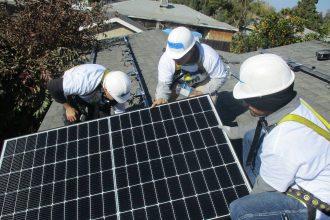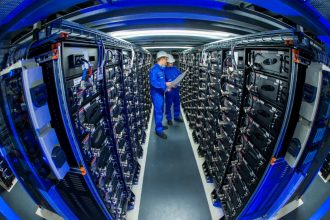
Illinois is up against what one observer calls a “nuclear hostage crisis”: The energy company Exelon says it will close two struggling nuclear power plants unless the state provides subsidies.
If this sounds familiar, it’s because something very similar happened in Illinois about five years ago, leading to a 2016 state law that subsidized two other Exelon nuclear plants in the state—a law now tainted by a still-unfolding bribery scandal.
Despite all the reasons to tell Exelon to take a hike, some consumer and environmental advocates say there is a strong case for keeping the plants open because they are an important source of carbon-free electricity. This ties into the larger, often acrimonious debate about the role of nuclear power in the transition away from fossil fuels.
“It makes sense to us that people want to punish Exelon,” said David Kolata, executive director of the Citizens Utility Board in Chicago. “But you have to be careful not to punish consumers and the environment too. That’s what makes it a much more thorny issue.”
Exelon said last week that it would close the Byron and Dresden nuclear plants in 2021, but “will continue our dialogue with policymakers on ways to prevent these closures.”
If the Byron and Dresden plants close, fossil fuels probably would fill much of the void, leading to an increase in carbon emissions, the company said. This would be a major setback in the state’s push to move away from fossil fuels.
Exelon owns all six nuclear plants in Illinois. This includes the two that would close in 2021, two (the Braidwood and LaSalle plants) that the company says are at risk of closing for financial reasons but are not yet scheduled to close and two (the Quad Cities and Clinton plants) that are subsidized by the 2016 law.
The six plants produced 54 percent of the electricity generated in the state last year. Coal is a distant second with 27 percent, followed by natural gas with 10 percent.
Renewable energy is growing, thanks in part to programs that also were part of the 2016 nuclear bailout legislation. But wind and solar are still small shares of the energy mix, with 8 percent and less than 1 percent, respectively.
Kolata said he supports giving additional aid to Exelon as long as it’s part of a legislative package that increases support for renewable energy and energy conservation, and as long as the company agrees to open its books to prove that the plants actually need the help.
“We see nuclear as the bridge to renewables,” he said. “We’d like to see coal go first, then gas, then nuclear.”
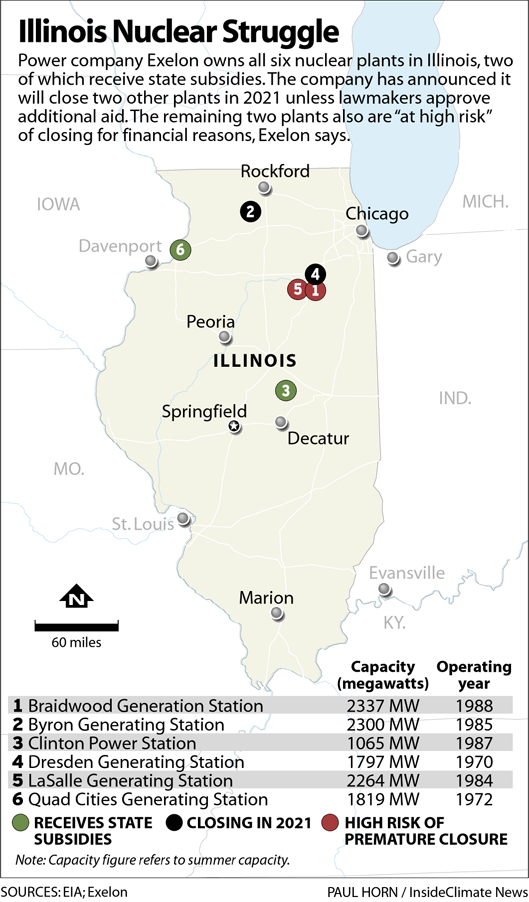
He said lawmakers should view the plants as an energy asset independent of the company that owns them.
Exelon has a lot of baggage these days. Federal prosecutors said in July that Commonwealth Edison, which is owned by Exelon, provided illegal payments and favors to help persuade lawmakers to pass the 2016 nuclear bailout.
ComEd agreed to pay $200 million to resolve the case, and is now cooperating in an ongoing probe that is likely to be focused on the lawmakers who allegedly accepted the favors, including Illinois House Speaker Mike Madigan, a Democrat.
Adding to the complexity of this debate is that environmental advocates are divided on whether nuclear should be part of a clean energy future. The case against nuclear is that it’s unsafe, with risks of devastating accidents and concerns about where to store nuclear waste.
David Kraft, director of the Nuclear Energy Information Service in Chicago, describes this latest push by Exelon as “yet another nuclear hostage crisis.” His group has been campaigning since 1981 for the country to phase out nuclear power.
“A better future for our children would be one that’s both carbon-free and radioactive waste free!” Kraft said in a guest commentary published Monday in The Chicago Tribune.
“To create a truly low-carbon and less-polluting energy future, put those funds gambled on nuclear directly into renewables, efficiency and energy storage upfront instead, eliminating nuclear power’s unpredictable risks and perpetual bailouts,” he said.
Some organizations have tried to stake out a middle ground. The Union of Concerned Scientists, a longtime nuclear watchdog, issued a report in 2018 that said nuclear bailouts can be good public policy if the plants are well-maintained, the plant owners are transparent about their financial needs, and the subsidies are part of a larger package that moves toward a transition to clean energy.
I’ve cited the UCS report many times since then because it helps to distinguish between proposals that have clear public benefits and those that are corporate giveaways.
The 2016 Illinois energy law met most, if not all, of the report’s conditions. Kolata and others in Illinois would like to see legislation this year that would do the same.
Gov. J.B. Pritzker, a Democrat, also is interested in passing major clean energy legislation this year, but he has said he won’t sign a bill “written by utility companies.”
I’ll be watching to see how this unfolds.
Meanwhile, Ohio Has Its Own Nuclear Debate
Ohio lawmakers talked this week about whether—and how—to repeal a 2019 nuclear bailout law whose main backers are now the subject of a federal bribery probe.
On a superficial level, the discussions in Ohio and Illinois have a lot in common with talk about the role of nuclear power in the energy system, and lots of intrigue from federal prosecutors. For more details, see my story from July.
But the tone in Ohio is different, largely because the state government is controlled by Republicans who place little value on making a smooth transition to clean energy.
“I’ve never known this state or this General Assembly to be overly concerned with the environment,” said Thomas Suddes, who teaches at Ohio University and writes about state politics for The Plain Dealer in Cleveland.
He said both parties tend to value retaining jobs for constituents and helping party allies, and that this usually takes precedence over ideology.
Closing the nuclear plants would cost thousands of jobs, and a bill repealing the subsidies could be used in arguments ahead of the November election to portray lawmakers as insensitive to local concerns in the areas that host the plants.
So, even with the bribery scandal, there is a natural reluctance to repeal the bill, which makes Suddes doubtful that any substantial action will happen in the next few months.
“The cautious thing to do for a lot of incumbents would be to leave it alone,” he said.
Gov. Mike DeWine and some legislators have said they want to repeal and replace the 2019 law. But the governor and many others say they still support many of the law’s provisions, including subsidies for the state’s two nuclear power plants, owned by Energy Harbor, the company formerly known as FirstEnergy Solutions.
For now, there is nothing approaching consensus on what a replacement should look like.
House Speaker Robert Cupp has said he favored repealing and replacing the law, although he has given no specifics about a replacement. He said this week that he will appoint a special committee to study the issue, which is likely to mean there will not be quick action on a repeal.
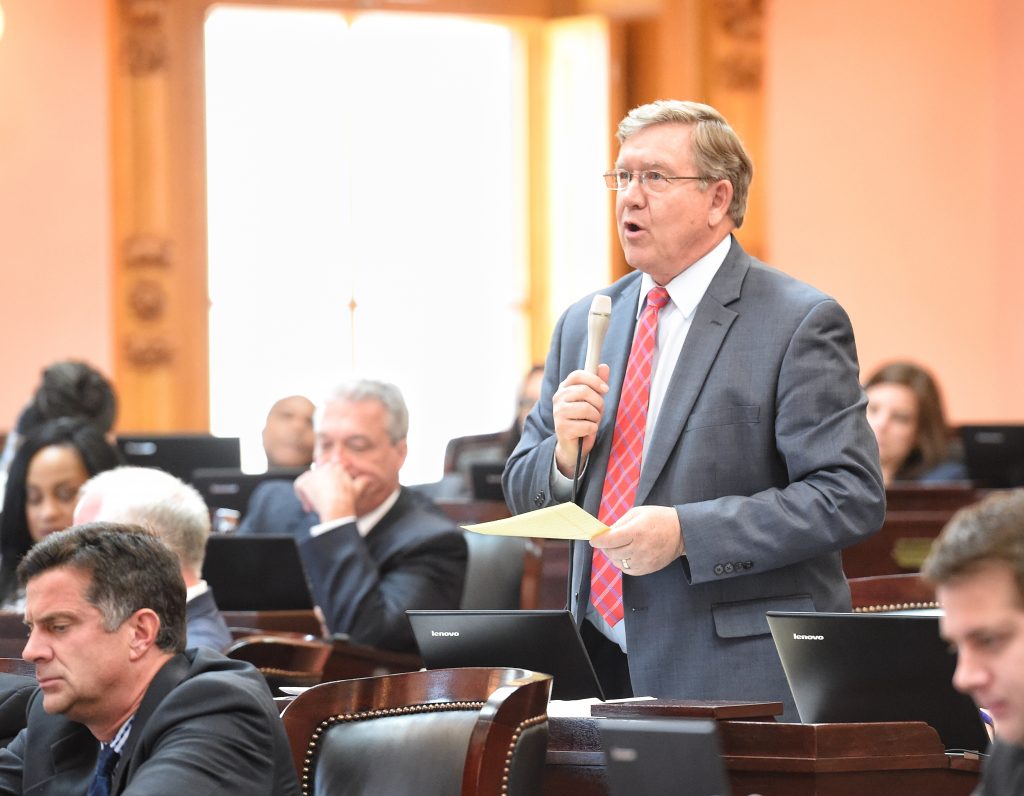
Cupp is brand new in his role, elected by his colleagues to replace Larry Householder, who was arrested and charged with allegedly leading the bribery scheme that helped to pass the law in 2019.
But Householder isn’t really gone. He showed up on the House floor on Tuesday, out on bond, and said he plans to plead not guilty. He told the gathered reporters that he thinks the nuclear bailout should be retained. Cupp was not pleased to see his predecessor, saying Householder’s presence was “offensive.”
Randi Leppla, the lead energy attorney for the Ohio Environmental Council Action Fund, said the situation with the repeal effort seems to change “hour by hour.”
“It’s very, very clear that what we need to be doing is ripping this off the books and starting over from scratch,” she said. “This bill is corrupt from the bottom up, and it’s really just bad policy for Ohio.”
In addition to the nuclear bailout, the Ohio law subsidizes two coal-fired power plants and eliminates state requirements that utilities meet annual benchmarks for renewable energy and energy conservation.
The combination of policies harmful to the environment have made the Ohio law an example of a nuclear bailout that has little public benefit, according to the Union of Concerned Scientists and many others.
At least for now, Ohio leaders are doing little to erase this dubious distinction.
The Decentralized Grid Comes to California Apartment Complexes
One of the ways to make the electricity grid more reliable is to make it less centralized, with buildings capable of producing and storing their own electricity.
And one of the most interesting companies working to make this happen has a big new project in California. Sonnen, with global headquarters in Germany, is working with a property developer and manager to provide energy storage systems in 3,000 apartment units in California.
The project covers seven apartment complexes in locations all over the state, all run by The Wasatch Group of Utah.
This is a form of virtual power plant, something I write about whenever I get the chance because I see this as a potentially groundbreaking way to make the whole electricity grid cleaner and more reliable.
Sonnen and Wasatch say this is the largest virtual power plant in the country that is exclusively based in apartment communities, with battery capacity of 24 megawatts.
The apartment complexes will use rooftop solar to fuel the battery storage systems. In addition to providing backup power for residents during blackouts—a big selling point in California, where utilities have carried out planned blackouts because of heat or wildfire risks—the batteries will be able to work in tandem to ramp up and provide all the power for the apartments when the wider grid is under stress.
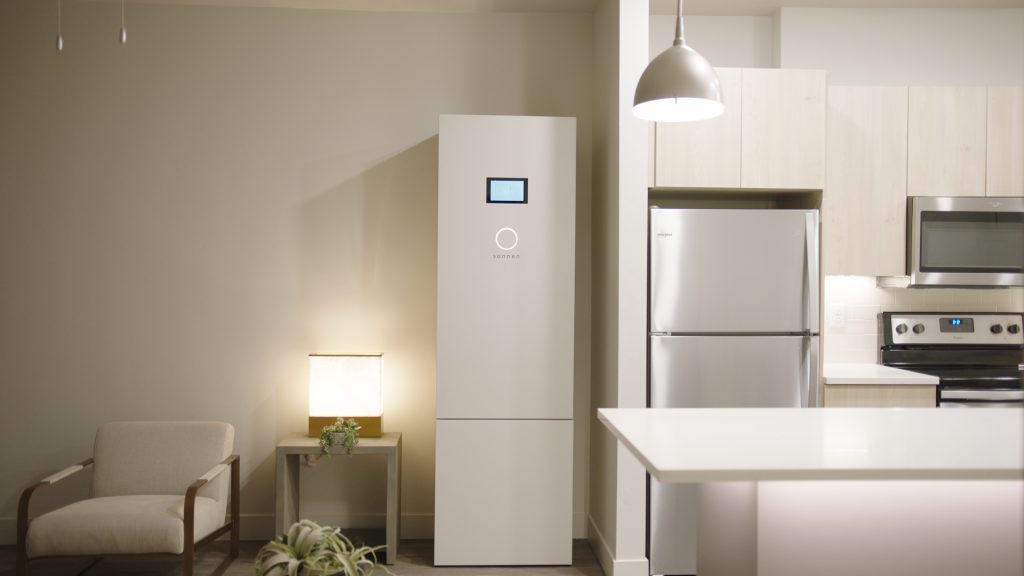
This has financial benefits, saving on electricity purchases from the utility at the times with the highest prices, and it helps to make the grid more stable for everyone by leaving more electricity on it for use by others.
“This community is actually a blueprint for all society,” said Blake Richetta, chairman and CEO of sonnen Inc. USA, the German company’s U.S. subsidiary, which is based in Atlanta. “If you’re trying to create a system for us to eliminate fossil fuels from electricity production in the future, you can’t achieve it without this sort of blueprint.”
He means that virtual power plants can reduce the need for fossil fuel plants that only operate at times of peak demand, which are some of the dirtiest plants on the market.
The project adds to The Wasatch Group’s track record of doing interesting energy projects at its properties. The company also worked with sonnen to develop a 600-unit virtual power plant at an apartment complex near Salt Lake City.
Ryan Peterson, president and managing partner of Wasatch Energy Group, told me that the solar and storage systems will provide immediate financial benefits because they will make the apartments more attractive to customers and will lead to energy cost savings.
The companies declined to say how much they are spending on the project, only that they expect the savings to cover the upfront costs. If this ends up meeting their expectations, then the project could be a trend-setter for other developers.
I know sonnen well after touring its global headquarters last summer during a reporting trip to Germany. The company was purchased by Shell in 2019 as part of the oil giant’s push to diversify into clean energy businesses. I will have a lot more to say about sonnen, and am eager to see how they continue to make inroads in the United States.
Inside Clean Energy is ICN’s weekly bulletin of news and analysis about the energy transition. Send news tips and questions to [email protected].









